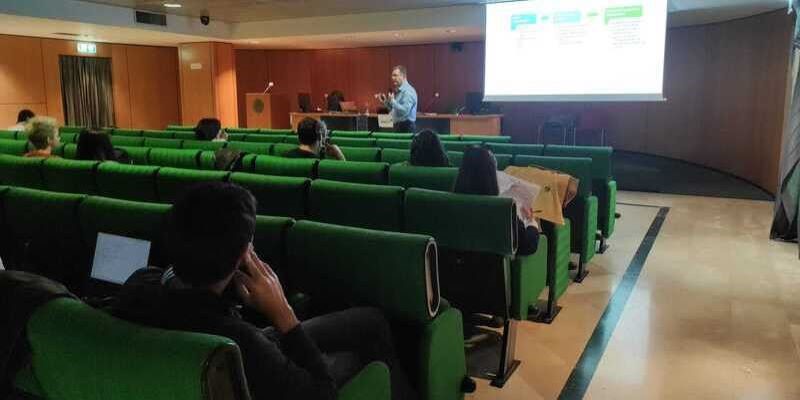
On 27 and 28 October 2023, the workshop "Token and Metaverse Economy - International Forum on Digital Transformation of Business and Society" was held at the Polytechnic University of Bari. The workshop has been organized by professors Antonio Messeni Petruzzelli and Umberto Panniello, researcher Angelo Natalicchio and PhD student Ilaria Mancuso, to discuss and analyze the new frontiers of digital innovation.
The workshop was held in the framework of the EBIT - Ecosystems for Business Transformation project, co-funded by the Interreg IPA CBC Italy-Albania-Montenegro programme. In fact, the workshop is one of the four international events planned within the EBIT project to create a network of organizations interested in digital and Industry 4.0 transformation, aimed at bringing scientific research and industry closer. The purpose of these events is to facilitate SMEs’ accessibility to the results of scientific and technological research, promote the creation of start-ups and clusters of innovative companies, and strengthen the competitiveness, entrepreneurship and social well-being of the territories involved.
In particular, the event organized at the Polytechnic University of Bari addressed the topic of digital innovation with a specific focus on the token and metaverse economy. This is an economy founded on virtual worlds, i.e., metaverses, and virtual products and services, i.e., tokens, producing tangible and concrete effects for companies, start-ups, as well as for society as a whole, since it substantially changes the ways in which relationships between companies and individuals develop. In this sense, the workshop aimed at understanding how the innovation of business models based on technologies related to tokens and metaverses can further transform companies and society, fueling discussions on best practices, problems and criticalities with some of the most authoritative scholars and professionals in the field of digital innovation.
Daniel Trabucchi, professor at the Polytechnic University of Milan, opened the workshop with the speech entitled "Platform Thinking in the Metaverse". The goal of the speech was to discuss the role of digital platforms in promoting innovative business models based on tokens and metaverses. Specifically, Professor Trabucchi showed how digital platforms commonly used in daily life (such as Uber, Booking, Airbnb and Google) can exploit metaverses to extend and improve the range of services offered to end users. The discussion then turned to the future, to understand how platforms can take advantage of the emerging potential and further evolve within the metaverses. This first intervention therefore highlighted how a metaverse is a collective virtual space created by the convergence of physical and digital reality, capable of bringing significant benefits to companies ready to seize emerging opportunities.
Seeing how this is possible was the subject of the second speech, held by Professor Wim Vanhaverbeke from the University of Antwerp. In fact, the speech focused on digital transformation, which, as a prelude to the economy of metaverses and tokens, is favored by an ecosystem approach to create value for the end user. In particular, to successfully complete a digital transformation journey, it is necessary to define an effective strategy to manage multiple actors both at intra- and inter-organizational level, in order to align them with the creation of value for end customers. In this way, it is possible to overcome critical issues such as the resistance to change of the subjects involved and the barriers, including technological ones, to the integration of information systems and data sources of various typologies, which arise during the digital transformation process. The digital transformation enabled in this way determines several advantages for the companies involved, ranging from the simplification of complex decision-making processes to the development of new competencies and learning mechanisms which, in turn, act as a stimulus to the innovative processes of the companies themselves. The speech of Professor Vanhaverbeke therefore led to understand which digital strategies can be adopted to successfully embrace technological change.
Strategy was also the focal point in the speech of Professor Michael Jacobides from the London Business School and the Project Leaders from Boston Consulting Group, Maxime Courtaux and Winson Chen, who opened the second day of the workshop with a complementary vision with respect to the academic studies characterizing the first two sessions. Their speech began with a systematization of the activities, experiences, and services that companies can offer within the metaverses, to create value for their customers. These allow, for instance, the enhancement of the way contents offered nowadays through social networks are accessed by users, the possibility of carrying out work and entertaining activities in completely new forms, the purchase and sale of digital goods and services, and the generation of new platforms to host content created by users through new collaborative forms. The speech also showed how these activities, experiences, and services are based on the continuous evolution and interoperability of multiple technologies (such as the Internet of Things, virtual and augmented reality, blockchain and advanced connectivity) and define different types of actors, value creation and capture mechanisms, and ecosystem configurations. This allowed the speakers to provide a precise indication of how companies can identify the most suitable strategy to be competitive in the metaverse, taking into consideration not only the characteristics and advantages of virtual businesses, but also the social problems, the mitigation risks actions, and the changes in regulations that characterize and may affect the token and metaverse economy.
The workshop was closed by the speech of Lucio Lamberti, Professor at the Polytechnic University of Milan. Professor Lamberti opened his speech presenting considerations, real data, and research outcomes that clearly showed how token and metaverse technologies are used in managerial practice to increase the competitive advantage of companies. Specifically, it emerged that investments are mainly concentrated in the energy, automotive, high-tech, tourism, media and entertainment sectors. Starting from these elements, Professor Lamberti presented the state of the art of marketing practices in the metaverse, with reference to a detailed analysis of real cases, discussing the approaches and results and highlighting how the metaverse can contribute to innovate businesses’ marketing strategies. In addition, Professor Lamberti showed the results of research on virtual experiences conducted in the laboratory he founded on marketing neuroscience, showing which metaverses’ design factors may make user experiences more engaging.
The workshop was attended by students, doctoral students, professors, and professionals from Apulia, Italy, and abroad. In total, the four sessions of the workshop were attended by more than 100 people, of which about half in presence and the rest remotely connected. The workshop also offered the opportunity to inspire the debate on the main economic and managerial issues of the token and metaverse economy phenomenon. In fact, in a phase in which there are increasing investments in digital technologies to make virtual worlds and products accessible to a wider audience, the central theme becomes understanding how these investments can create value for users and offer businesses the ability to generate sustainable profits. In this context, the workshop "Token and Metaverse Economy - International Forum on Digital Transformation of Business and Society" made it possible to investigate, both from an academic and managerial perspective, how tokens and metaverses can represent a real potential for economic growth.




